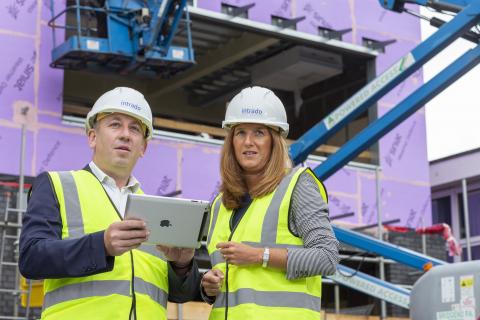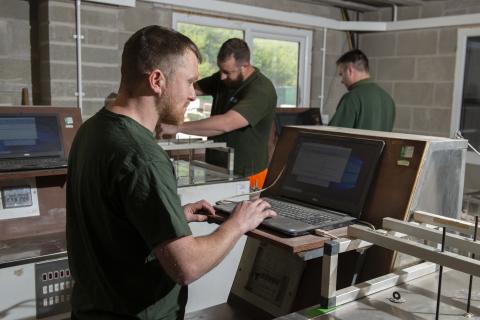Construction is a complex and highly competitive sector hit by external pressures that can threaten the size of profits, overhead, and cash flow. Those challenges have been compounded as economic uncertainty delays contracts; the likely end of freedom of movement reduces the labor force; and concerns about materials and funding that are not yet fully understood. It's no surprise then that businesses in the supply chain are turning to technology to manage the things they could.
Has the digital world become steeped in bricks and mortar as companies consolidate footing during turbulent times?
Digital Maturity Survey for Wales 2018 research by Cardiff University, indicates that last year there was a huge shift in the number of small construction businesses using some form of online technology to solve problems. Some are using it to maintain better supply chain management and accreditation to meet regulations sooner. Others use it to bin processes using online project management and contract management systems. A large number of businesses have been trying to stabilise cash flow with better account packages, or to win new contracts and attract new employees using digital marketing.
Can an industry associated with traditional methods learn from those adopting the modern technology?
Evidence of the benefits can be seen from companies that have taken advantage of the free training that Accelerate Wales for Business provides. They include Intrado, which grew by 300% over three years and employed 6 new members of staff. Celtest, which unlocked 2,000 hours in a year through efficiencies. And Hazelwood, which has increased production by 20% and future-proofed the business from the changing demands of the industry. So, what can we learn from these companies adopting the modern technology despite being in an industry associated with more traditional methods?
Darren Sparkes from Intrado Consulting Engineers said: "Online accounting manages the cash flow and reduces administrative work and Building Information Modelling (BIM) allows us to plan projects effectively and convince clients and the supply chain. We managed to grow by 300% and employ 6 new members of staff..."
Like many other companies, the Cardiff-based civil and structural engineering firm had an ambitious strategy for growth that relied on projects running quickly and smoothly. Therefore, they decided to transform the way the company operated and actively adopt digital ways of working in 2015. They introduced Construction Management software to offer models of digital imagery, the latest real-time project management information and improved supply chain management. In addition, they adopted an online accountancy package to manage the cash flow, reduce administrative work, and plan projects effectively. Read the full story.
Sparkes said "We're not saying digital resources are the only reason we've benefited so much, but it has streamlined our internal processes and given us an edge in a competitive industry."
Iwan Morgan from Celtest said: "Our online invoicing and electronic reporting systems save us 2,000 hours a year, which gives us more time to manage the large number of queries we receive through our updated website or through our cheaper VoIP phone system..."
Celtest saw similar results. The company produces thousands of reports for construction companies, civil engineers, quarry companies and aggregate companies to ensure they meet the required standards. These include soil, concrete, asphalt and aggregates.
A year ago, the company decided to scrap paper and move to digital altogether. We decided to adopt digital marketing strategies and upgrade the website to attract new customers. They also moved to cloud technology so that the technicians could communicate important information to the office in real time. That meant reports could be completed within 24 hours rather than in three or four days. In addition, an online accountancy package ensured invoices could keep track of cash flow, and a VoIP phone system saved more money. Read the full story.
"The move to digital meant that working pattern changed for many members of staff and that took quite a while to get used to. But now everyone is supportive, and the investment has already paid off," Morgan said.
"We moved to a larger site because we used a special contract management system with a mobile app to increase productivity by 20% and have won significant new contracts with the help of an updated website..." Sharon Smith, Hazelwood Carpentry
Not all companies use digital technology in the same way. Hazelwood Carpentry, which employs 29 people and works for some of the largest building contractors across Wales and the South West of England, decided to choose a special system. "The decision has enabled us to manage projects more efficiently by giving the team full transparency of costs and timescales across all live projects in real time. On-site supervisors log in remotely through an app on their phone and monitor what's being done in the office, so we can reduce duplication. This has replaced around 15 different spreadsheets that were being completed by people on pieces of paper in different parts of the business, so it's a big change," smith said. Read the full story.
63% of smaller construction companies in Wales have taken their first steps on their digital journey So, despite the fact that some within the construction industry believe that digital
thinking is in its early stages, others are reaping the benefits. The good news is that 63% of smaller Welsh businesses in this sector have taken the first steps on their digital journey. Has the current uncertainty in this complex and highly competitive sector caused the feeling that it makes sense to control the things that businesses can control? Is the sector ready to follow the attitude of Intrado, Celtest, and Hazelwood in trying to solve the challenges by turning them into opportunities to benefit through digital fitness? The findings in Cardiff University's research, and feedback from Accelerate Wales for Business suggest that businesses are gaining confidence and that support is available for those who want to change.



